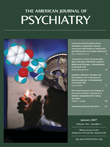A Randomized, Controlled Trial With 6-Month Follow-Up of Repetitive Transcranial Magnetic Stimulation and Electroconvulsive Therapy for Severe Depression
Abstract
Objective: Repetitive transcranial magnetic stimulation (rTMS) has been reported to be as effective as electroconvulsive therapy (ECT) for major depression. The authors conducted a multicenter randomized, controlled trial to test the equivalence of rTMS with ECT. Method: Forty-six patients with major depression referred for ECT were randomly assigned to either a 15-day course of rTMS of the left dorsolateral prefrontal cortex (N=24) or a standard course of ECT (N=22). The primary outcome measures were the score on the 17-item Hamilton Depression Rating Scale (HAM-D) and the proportion of patients with remissions (Hamilton score, ≤8) at the end of treatment. Secondary outcomes included mood self-ratings on the Beck Depression Inventory-II and visual analogue mood scales, Brief Psychiatric Rating Scale (BPRS) score, and both self-reported and observer-rated cognitive changes. The patients were followed up after 6 months. Results: HAM-D scores at the end of treatment were significantly lower for ECT, with 13 patients (59.1%) achieving remission in the ECT group and four (16.7%) in the rTMS group. However, at 6 months the HAM-D scores did not differ between groups. Beck scale, visual analogue mood scale, and BPRS scores were lower for ECT at the end of treatment and remained lower after 6 months. Self- and observer-rated cognitive measures were similar in the two groups. Conclusions: rTMS was not as effective as ECT, and ECT was substantially more effective for the short-term treatment of depression.



